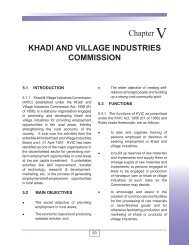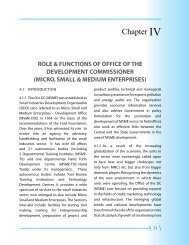Evaluation Study MSE Cluster Development - Ministry of Micro ...
Evaluation Study MSE Cluster Development - Ministry of Micro ...
Evaluation Study MSE Cluster Development - Ministry of Micro ...
You also want an ePaper? Increase the reach of your titles
YUMPU automatically turns print PDFs into web optimized ePapers that Google loves.
Nevertheless, it is expected that the information gained as a result <strong>of</strong> the diagnosticstudy and the joint preparation <strong>of</strong> the action plan (especially concerning the competitiveposition <strong>of</strong> the cluster in the national and international market) will suffice to identify thepotentialities <strong>of</strong> the cluster as well as the key obstacles which prevent it from taking upthe opportunities provided by the globalisation <strong>of</strong> the Indian economy. As these obstaclesare identified, a key task is to help the partner institutions to prioritise them (both interms <strong>of</strong> their importance and <strong>of</strong> the capacity <strong>of</strong> the cluster actors to jointly tackle them)and to identify the initiatives which can relieve them including the utilization <strong>of</strong> existingBDS and the development <strong>of</strong> new ones.The elaboration <strong>of</strong> an action plan is meant as the initial step for the development <strong>of</strong> pilotprojects where groups <strong>of</strong> firms sharing similar constraints (networks) are formed andspecific initiatives are formulated and implemented. During this phase, co-operationstarts bearing concrete results to the participating enterprises. The initiatives aregenerally <strong>of</strong> a commercial and/or promotional kind (e.g. joint participation in fairs, jointpurchase <strong>of</strong> raw materials, design <strong>of</strong> a collective catalogue). The idea is to generatevisible results (although <strong>of</strong> a short-term nature) to engender optimism and trust. At thesame time, the pilot projects consolidate willingness <strong>of</strong> the networks and associations toundertake long-term strategic initiatives around an increasingly shared vision for thecluster as a whole. These projects generally entail an increase in the degree <strong>of</strong>specialization by process and/or by product <strong>of</strong> the firms involved (e.g. restructuring orcreation <strong>of</strong> common service facilities, new product lines, common brands). It is at thisstage that the involvements <strong>of</strong> both technical and financial institutions become essentialand that the initiatives are meant to contribute more directly to the creation <strong>of</strong> capacitiesat the cluster level. UNIDO therefore ensures that the networks/associations supportedby the projects can draw assistance from the available institutions. As will be emphasisedin subsequent Chapters, this task <strong>of</strong>ten implies upgrading the capacity <strong>of</strong> BDS providersor even initiating their establishment, especially in clusters characterised by a relativelyweak support framework.Finally the intervention gives way to a self-management phase, as the networks /associations gain greater autonomy from the sponsoring agency’s assistance and thecapacity to undertake further joint activities independently. It is during this phase that itbecomes possible to test whether the earlier investment on vision- and capacity buildinghas delivered the expected results and if the cluster approach has won the endorsement<strong>of</strong> the various cluster actors. Self-management is not always easily achieved. Often thenetworks/associations tend to lean on sponsoring agency’s assistance for a longer timethan initially envisaged. In order to avoid dependency the work plan established by thecluster actors and the Focal Point must have a specific time frame. The cluster actorsthus know from the beginning that they can count on assistance only for a limited period<strong>of</strong> time. As the various networks/associations develop, sponsoring agency’s interventionshifts towards s<strong>of</strong>ter co-ordination and a progressive transfer <strong>of</strong> responsibilities to thecluster actors is ensured.15
















